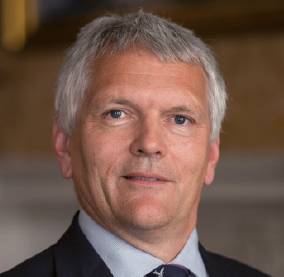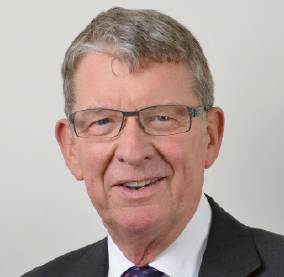Message from RAeS
Message from RAeS
 I was really pleased to be able to introduce our inaugural Mary Jackson Lecture, which is a new Named Lecture celebrating the work of the individuals from BAME communities within aerospace. The lecture series has been named in honour of Mary Jackson (1921-2005), who became the first black female aerospace engineer at NASA in 1958 and was featured in the book and film Hidden Figures. The lecture was presented by Dr Moogega Cooper who is currently the Planetary Protection Lead for the Europa Lander concept at NASA’s Jet Propulsion Laboratory. Her expertly delivered talk provided an overview of the NASA M2020 mission which was designed to investigate key questions related to the habitability of Mars and will conduct assessments that will help plan for future human exploration of Mars. You will remember that we signed an MoU with the American Institute of Aeronautics and Astronautics last summer and we were delighted that this lecture has been facilitated by working in association with the AIAA. Particular thanks must go to Claudine Phaire from the AIAA and Richard Gearing from the RAeS, who chair their respective Diversity & Inclusion Committees and who both spoke after the lecture about ongoing D&I initiatives in both organisations.
I was really pleased to be able to introduce our inaugural Mary Jackson Lecture, which is a new Named Lecture celebrating the work of the individuals from BAME communities within aerospace. The lecture series has been named in honour of Mary Jackson (1921-2005), who became the first black female aerospace engineer at NASA in 1958 and was featured in the book and film Hidden Figures. The lecture was presented by Dr Moogega Cooper who is currently the Planetary Protection Lead for the Europa Lander concept at NASA’s Jet Propulsion Laboratory. Her expertly delivered talk provided an overview of the NASA M2020 mission which was designed to investigate key questions related to the habitability of Mars and will conduct assessments that will help plan for future human exploration of Mars. You will remember that we signed an MoU with the American Institute of Aeronautics and Astronautics last summer and we were delighted that this lecture has been facilitated by working in association with the AIAA. Particular thanks must go to Claudine Phaire from the AIAA and Richard Gearing from the RAeS, who chair their respective Diversity & Inclusion Committees and who both spoke after the lecture about ongoing D&I initiatives in both organisations.
In these continuing difficult times, our mental health and well-being is being challenged constantly across all aspects of our lives, be it at a personal or professional level, with not just the direct effects of Covid-19 on our health to consider but also the resulting lockdowns, furloughs, redundancies, shrinking of order books, lost apprenticeships, working from home, online university education, etc. The Society has recognised the effects of mental health across the aerospace and aviation communities and has previously run a number of conferences and events addressing this important topic. I can recommend two upcoming events on a similar theme:
- The Mental Wellbeing and Human Performance event aimed at aircrew is on 27 April – this event has been part of a series of conferences over the past few years since the Germanwings incident.
- Maintaining Wellbeing: Opening up in the Maintenance Environment event on 20 May – this event is aimed at maintenance and safety engineers and professionals.
On a related topic, the CEO and I recently participated in an IMechE/IET/RAeS Mental Health & WellBeing Talking Together conversation, discussing issues relating to young professionals in STEM careers such as loneliness in the workplace, disappointment and uncertainty which might be of interest to readers. See https://www.aerosociety.com/news/mental-health-wellbeing-talkingtogether-with-professor-jonathan-cooperfraes-sir-brian-burridge-fraes/. Participating in this event got me thinking about a number of issues myself that I hadn’t considered before.
So, the Brexit deal has finally been done, not surprisingly at the last minute, but the ramifications of this momentous change to our relationship with the rest of Europe will take some time to become clear, particularly as many issues affecting the aerospace, aviation and space communities remain to be finalised (see Brexit at Arrivals). At the moment, Covid restrictions permitting, we can still fly to Europe; however, the effect on the aerospace manufacturing industry will take many months, if not years, to play out. Not being able to participate in the EU Galileo and EGNOS programmes will surely cause difficulties and limit the UK’s capabilities. I was pleased to see that the UK will become an Associate Member of the EU Horizon Europe research programmes which enables the participation of UK universities and industry in large collaborative projects but I do have concerns that, as one of the major benefactors of the current H2020 and previous programmes, the government may find the cost of Horizon Europe membership prohibitive. A further issue that may have a knock-on effect is that a large proportion of researchers in UK universities and engineers in industry are from the EU and delays are already starting to occur in recruitment due to visa requirements. In the years leading up to Brexit, the Society briefed about the potential consequences; I hope that some of the possible outcomes that we warned about don’t occur and that the Society’s communities are able to prosper post-Covid and post-Brexit.
Finally, the Sir Robert Hardingham Presidential Sword is a prestigious award presented annually by the President in recognition of outstanding service to the Society. I am honoured to present this year’s award to Jenny Body, in recognition of her long and valuable contribution to the Society, including being a former President (and first woman to hold that role), significant leadership of our Education and Skills activities and contributing in many other areas. In normal circumstances we would have announced and presented the award at the Wilbur and Orville Wright Lecture but, due to the on-going situation with Covid-19, this will not be possible this year. Instead, there will be a virtual announcement via our website and social media channels to celebrate the award.
